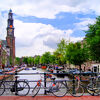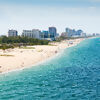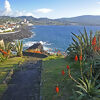31 Nights | Europe
About Dunmore East, Ireland
You will visit the following 17 places:

Belfast
Belfast (meaning: "mouth of the sandbanks") is the capital and largest city of Northern Ireland, the second-largest city in Ireland after Dublin, and is situated around the River Lagan, which runs through the city. It is a port city known as the birthplace of the RMS Titanic, and for its political murals, documenting the ‘Troubles’ of the 20th century. Today, Belfast remains a centre for industry, as well as the arts, higher education, business, and law, and is the economic engine of Northern Ireland. The city suffered greatly during the period of conflict called "the Troubles", but latterly has undergone a sustained period of calm, free from the intense political violence of former years, and substantial economic and commercial growth. Additionally, Belfast city centre has undergone considerable expansion and regeneration in recent years, notably around Victoria Square.

Antwerp
Belgium’s second largest and international port city with history dating to the Middle Ages, Antwerp is a major destination in Belgium in the region of Flanders. It has a beautiful historic city center, and is world-renowned for its fashion industry. Renowned for being the "world's leading diamond city", more than 70% of all diamonds are traded in Antwerp. Due to its long and culturally rich history, the city of Antwerp houses many interesting historical buildings from different historical periods, as well as a lot of interesting museums. Recently it has become a trendy city, attracting a lot of Flemish and foreign artists, writers, intellectuals, and actors.

Admiral Street Police Station (Merseyside Police)
Liverpool is an important city of Merseyside, England. It was founded as a borough in 1207 and was granted city status in 1880. It is a major city famed for culture, football teams, The Beatles and buzzing nightlife. It lies within the historic county boundaries of Lancashire. It is also a large, vibrant city with great cultural heritage and was awarded the title of European Capital of Culture 2008, with the famous Pier Head Waterfront being a UNESCO World Heritage site since 2004.

Dublin South
Dublin is the largest and capital city of Ireland. The English name is derived from the Irish name Dubh Linn, meaning "black pool". It is a primate city with an urban population of over 1 million, containing almost 25% of the country's population. Dublin is situated near the midpoint of Ireland's east coast, at the mouth of the River Liffey, and at the centre of the Dublin Region. The city is listed by the Globalization and World Cities Research Network (GaWC) as a global city, with a ranking of "Alpha-", placing it among the top thirty cities in the world. It is a historical and contemporary centre for education, the arts, administration, economy and industry.

The Convent Amsterdam
Amsterdam is the capital of the Kingdom of the Netherlands. It is the country's largest city and its financial, cultural, and creative centre. Many large Dutch institutions have their headquarters there, and seven of the world's 500 largest companies, including Philips and ING, are based in the city. In 2012, Amsterdam was ranked the second best city in which to live by the Economist Intelligence Unit (EIU) and 12th globally on quality of living for environment and infrastructure by Mercer. Amsterdam derives its name from the city’s origin as “Dam” of river “Amstel”. In the past, the name was "Amstelredamme" which later changed as “Amsterdam”. The city is one of the most popular destinations in Europe, attracting over 7 million international travellers annually. The city is colloquially known as ''Venice of the North'' because of its lovely canals that criss-cross the city, its impressive architecture and more than 1,500 bridges. There is something for every traveller's taste here; whether you prefer culture and history, serious partying, or just the relaxing charm of an old European city!

Fort Lauderdale
Fort Lauderdale is a city in the U.S. state of Florida, 28 miles (45 km) north of Miami. The city is a popular tourist destination, with an average year-round temperature of 75.5 °F (24.2 °C), and 3,000 hours of sunshine per year. Greater Fort Lauderdale which takes in all of Broward County hosted 12 million visitors in 2012, including 2.8 million international visitors. The district has 561 hotels and motels comprising nearly 35,000 rooms. Greater Fort Lauderdale has over 4,000 restaurants, 63 golf courses, 12 shopping malls, 16 museums, 132 nightclubs, 278 parkland campsites, and 100 marinas housing 45,000 resident yachts. Fort Lauderdale is named after a series of forts built by the United States during the Second Seminole War. The forts took their name from Major William Lauderdale (1782–1838), younger brother of Lieutenant Colonel James Lauderdale. William Lauderdale was the commander of the detachment of soldiers who built the first fort.

Ponta Delgada
Ponta Delgada is the largest municipality and administrative capital of the Autonomous Region of the Azores in Portugal. It is located on São Miguel Island, the largest and most populous in the archipelago. Cruise ships on repositioning voyages between North America and Europe often call there. Cruise-ship visitors to Ponta Delgada will often drive out into the countryside for visits to small villages and natural volcanic wonders. There's usually time afterward for a relaxed amble through the lovely port city, noted for its squares paved with black and white tiles, fabulous churches, and public buildings with their white-painted facades and brown-black volcanic stone trim. Given its dimension and the diversity of facilities and services it offers, Ponta Delgada is also the place for experiencing, a true gateway to the active discovery of the Azores Archipelago, with many things to do.

Le Havre

Guernsey

Horta

Zeebrugge

Brest

Portvendres

Portree

Ilfracombe

Cherbourg
Cherbourg-Octeville is a city and former commune situated at the northern end of the Cotentin peninsula in the northwestern French department of Manche. Due to its union, it is the most populated city in its department with 37,121 inhabitants making it the first city of the department before the Saint-Lô prefecture and the second in the region after Caen. Cherbourg-en-Cotentin is protected by Cherbourg Harbour, between La Hague and Val de Saire, and the city has been a strategic position over the centuries, disputed between the English and French. Cited as one of the "keys to the kingdom" by Vauban, it became, by colossal maritime development work, a first-rate military port under the leadership of Louis XVI and Napoleon, and holds an arsenal of the French Navy. A stopping point for prestigious transatlantic liners in the first half of the 20th century, Cherbourg was the primary goal of US troops during the invasion of Normandy in 1944. Along with its use as a military, fishing and yachting port, it is also a cross-Channel ferry port, with routes to the English ports of Poole and Portsmouth, the Irish port of Rosslare Harbour and St Helier on Jersey. Limited by its geographical isolation from being a great commercial port, it is nonetheless an important shipbuilding centre, and a working-class city with a rural hinterland.











